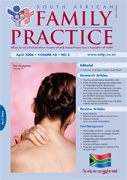Teaching and assessing consultation skills: an evaluation of a South African workshop on using the Leicester Assessment Package
Keywords:
Consultation, assessment, medical student, competence
Abstract
Background The attainment of competence in consulting with patients is a central aim of medical students before graduation. Direct observation of complete consultations using a validated assessment instrument is the best method of judging this competence, but the need for several cases can pose problems with feasibility. The Leicester Assessment Package (LAP) has acceptable reliability and validity in the United Kingdom. The workshop reported on in this paper aimed to improve the teaching and assessment of consultation competence by clinical teachers. Method Twenty-two experienced South African medical educators participated in a three-day workshop. Their attitudes to the LAP and the forms of teaching that its use promotes were analysed by responses to pre- and post-workshop questionnaires with Likert-scale and free-text questions. Results The participants were positive about the LAP at the end of the workshop. They all believed that it was a useful instrument, and a majority would apply this method in their own departments. There were continuing reservations about the feasibility of the method and some respondents felt it would require some adaptation, particularly to the criteria for awarding grades. Conclusions The workshop participants learnt to use an instrument developed in the United Kingdom that encourages an analytical approach to the assessment and teaching of consultation skills. They believed it would be useful in the contexts in which they worked.
Published
2006-05-01
Section
Original Research
By submitting manuscripts to SAFP, authors of original articles are assigning copyright to the South African Academy of Family Physicians. Copyright of review articles are assigned to the Publisher, Medpharm Publications (Pty) Ltd, unless otherwise specified. Authors may use their own work after publication without written permission, provided they acknowledge the original source. Individuals and academic institutions may freely copy and distribute articles published in SAFP for educational and research purposes without obtaining permission.

